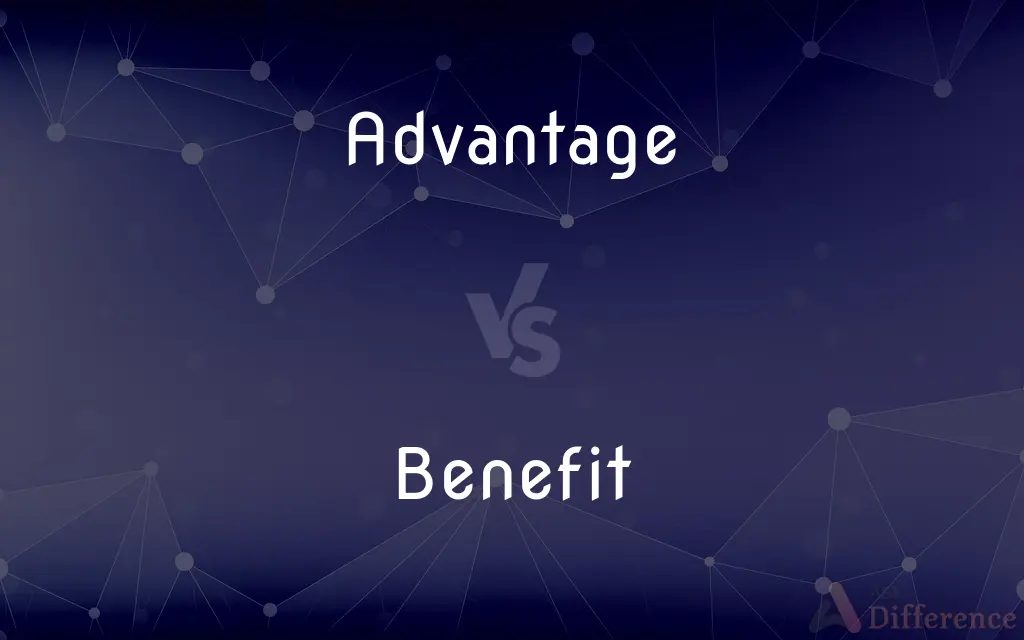Advantage vs. Benefit — What's the Difference?
Edited by Tayyaba Rehman — By Fiza Rafique — Updated on October 31, 2023
An advantage is a favorable condition or position that gives superiority, while a benefit is a positive outcome or gain derived from a situation or action.

Difference Between Advantage and Benefit
Table of Contents
ADVERTISEMENT
Key Differences
Advantage and benefit, though often used interchangeably, have nuanced differences. An advantage refers to a favorable position or condition that puts one in a superior or more favorable position. For example, having advanced technology gives a company an advantage over its competitors. On the other hand, a benefit is a positive outcome, profit, or gain received from something. This might include the health benefits of eating vegetables.
The concept of advantage often implies a comparison or competition. For instance, a person with a higher educational background might have an advantage in the job market. Benefit, in contrast, generally refers to the positive aspects or outcomes one receives, not necessarily in a competitive context. For example, the benefit of regular exercise is improved health.
Advantage can also suggest an inherent or structural feature that provides superiority. In sports, playing on a home field might be considered an advantage. Meanwhile, benefit tends to focus more on the positive results or effects, like the benefits of teamwork leading to greater productivity and job satisfaction.
In some contexts, advantage can have a slightly negative connotation, implying an unfair or unearned superiority. Conversely, benefit usually has a universally positive connotation, emphasizing the positive outcomes or support provided to someone.
Comparison Chart
Focus
Competitive edge or superiority.
Positive outcome or gain.
ADVERTISEMENT
Usage in Context
Often implies comparison or competition.
Implies positive results, not necessarily competitive.
Connotation
Can have a negative connotation if unfair.
Universally positive connotation.
Implication
Suggests an inherent or structural feature aiding success.
Focuses on the positive effects or outcomes.
Relation to Action
Implies a favorable position often before action.
Implies positive results from an action or situation.
Compare with Definitions
Advantage
A condition giving a greater chance of success.
Having insider knowledge was a clear advantage in the negotiation.
Benefit
An advantage; help or aid from something.
She can't read, so the voice recording was made for her benefit.
Exposure to cutting-edge technologies is one of the benefits of the job.
Advantage
Superiority or benefit in comparison to others.
Her extensive experience gave her an advantage in the job interview.
Benefit
An advantage or profit gained from something.
The benefit of regular exercise is better health.
Advantage
A feature or factor contributing to superiority.
The team's speed is their biggest advantage on the field.
Benefit
An advantage or profit gained from something
Enjoy the benefits of being a member
The changes are of benefit to commerce
Advantage
A favorable or beneficial circumstance.
The new tax laws put small businesses at an advantage.
Benefit
A payment made by the state or an insurance scheme to someone entitled to receive it
Part-time jobs supplemented by means-tested benefits
Families on benefit
Advantage
A beneficial factor or combination of factors
Being tall is usually an advantage in basketball.
Benefit
An event such as a concert or game that is intended to raise money for a particular player or charity
A benefit gig
The social season was highlighted by debutante balls and charity benefits
Advantage
Benefit or profit; gain
It is to your advantage to invest wisely.
Benefit
Receive an advantage; profit
The areas would benefit from regeneration
Advantage
A relatively favorable position; superiority of means
A better education gave us the advantage.
Benefit
Something that promotes or enhances well-being; an advantage
The nurse explained the benefits of regular exercise.
Advantage
The first point scored in tennis after deuce.
Benefit
Help; aid
The field trip was of great benefit to the students.
Advantage
The resulting score.
Benefit
A payment made by a government agency or insurance company to qualifying persons in time of need
An increase in welfare benefits.
Advantage
(Sports) A situation in soccer in which the referee has signaled that a foul has been committed but delays making the call because the fouled team has a more favorable position in play. If the fouled team loses this favorable position, the referee then makes the call.
Benefit
A form of compensation, such as paid vacation time, subsidized health insurance, or a pension, provided to employees in addition to wages or salary as part of an employment arrangement. Also called fringe benefit.
Advantage
To afford profit or gain to; benefit.
Benefit
A public entertainment, performance, or social event held to raise funds for a person or cause.
Advantage
(countable) Any condition, circumstance, opportunity or means, particularly favorable or chance to success, or to any desired end.
The enemy had the advantage of a more elevated position.
Benefit
(Archaic) A kindly deed.
Advantage
(obsolete) Superiority; mastery; — used with of to specify its nature or with over to specify the other party.
Benefit
To be helpful or useful to.
Advantage
Superiority of state, or that which gives it; benefit; gain; profit
The advantage of a good constitution
Having the faster car is of little advantage.
Benefit
To derive benefit
You will benefit from her good example.
Advantage
(tennis) The score where one player wins a point after deuce but needs the next to carry the game.
Benefit
(insurance) A payment made in accordance with an insurance policy or a public assistance scheme.
Advantage
(soccer) The continuation of the game after a foul against the attacking team, because the attacking team are in an advantageous position.
Benefit
An event, such as a theatrical performance, given to raise funds for some cause.
Advantage
Interest of money; increase; overplus (as the thirteenth in the baker's dozen).
Benefit
(obsolete) beneficence; liberality
Advantage
(transitive) to provide (someone) with an advantage, to give an edge to
Benefit
Intended audience (as for the benefit of).
The whole scene was staged for his benefit, and it completely fooled him.
Since my wife is Canadian, whenever we have dinner with my family, they keep bringing up anything they've heard about Canada lately for her benefit.
Advantage
(reflexive) to do something for one's own benefit; to take advantage of
Benefit
(transitive) To be or to provide a benefit to.
Advantage
Any condition, circumstance, opportunity, or means, particularly favorable to success, or to any desired end; benefit; as, the enemy had the advantage of a more elevated position.
Give me advantage of some brief discourse.
The advantages of a close alliance.
Benefit
(intransitive) To receive a benefit (from); to be a beneficiary.
Advantage
Superiority; mastery; - with of or over.
Lest Satan should get an advantage of us.
Benefit
An act of kindness; a favor conferred.
Bless the Lord, O my soul, and forget not all his benefits.
Advantage
Superiority of state, or that which gives it; benefit; gain; profit; as, the advantage of a good constitution.
Benefit
Whatever promotes prosperity and personal happiness, or adds value to property; advantage; profit.
Men have no right to what is not for their benefit.
Advantage
Interest of money; increase; overplus (as the thirteenth in the baker's dozen).
And with advantage means to pay thy love.
Benefit
A theatrical performance, a concert, or the like, the proceeds of which do not go to the lessee of the theater or to the company, but to some individual actor, or to some charitable use.
Advantage
The first point scored after deuce.
Benefit
Beneficence; liberality.
Advantage
To give an advantage to; to further; to promote; to benefit; to profit.
The truth is, the archbishop's own stiffness and averseness to comply with the court designs, advantaged his adversaries against him.
What is a man advantaged, if he gain the whole world, and lose himself, or be cast away?
Benefit
Natural advantages; endowments; accomplishments.
Advantage
The quality of having a superior or more favorable position;
The experience gave him the advantage over me
Benefit
To be beneficial to; to do good to; to advantage; to advance in health or prosperity; to be useful to; to profit.
I will repent of the good, wherewith I said I would benefit them.
Advantage
First point scored after deuce
Benefit
To gain advantage; to make improvement; to profit; as, he will benefit by the change.
Advantage
Benefit resulting from some event or action;
It turned out to my advantage
Reaping the rewards of generosity
Benefit
Financial assistance in time of need
Advantage
Give an advantage to;
This system advantages the rich
Benefit
Something that aids or promotes well-being;
For the common good
Advantage
The state of having a benefit over others.
Being bilingual is an advantage in the global job market.
Benefit
A performance to raise money for a charitable cause
Benefit
Derive a benefit from;
She profited from his vast experience
Benefit
Be beneficial for;
This will do you good
Benefit
A payment or gift made by an employer, the state, or an insurance company.
Employees receive health insurance as part of their benefits.
Benefit
Something that promotes well-being.
The benefit of a balanced diet is undeniable.
Benefit
A public performance or other entertainment to raise money for a charitable cause.
They organized a concert as a benefit for the flood victims.
Benefit
To derive advantage or improvement.
She benefited greatly from her meditation practice.
Common Curiosities
Can benefit have a negative connotation?
Typically, benefit has a positive connotation, focusing on positive outcomes or gains.
Is benefit always a result of an action?
Mostly, benefits are seen as positive outcomes from actions or conditions.
What is the primary difference between advantage and benefit?
Advantage refers to a favorable condition for success, while benefit is a positive outcome or gain.
Can something be both an advantage and a benefit?
Yes, certain conditions or factors can be both an advantage and provide benefits.
Can advantage be inherent?
Yes, an advantage can be an inherent feature that provides superiority.
Is benefit related to welfare and well-being?
Yes, benefit often relates to positive outcomes that promote well-being.
Are benefits always tangible?
No, benefits can be both tangible and intangible.
Are benefits always individual?
Benefits can be individual or collective, depending on the context.
Does advantage always imply competition?
Often, but not always. It can also indicate a favorable condition.
Can advantage be unfair?
Sometimes, especially if it's unearned or leads to inequality.
Can disadvantages be turned into advantages?
In some cases, yes, through strategy or changing perspectives.
Does advantage always lead to success?
Not necessarily, but it often increases the chances of success.
Is an advantage always obvious?
Not always; some advantages might be subtle or unrecognized.
Can everyone have the same advantage?
No, as advantages often imply a relative superiority over others.
Are benefits always planned or expected?
Benefits can be both planned and unexpected, depending on the situation.
Share Your Discovery

Previous Comparison
Cloth vs. Rag
Next Comparison
Drawing vs. PlanAuthor Spotlight
Written by
Fiza RafiqueFiza Rafique is a skilled content writer at AskDifference.com, where she meticulously refines and enhances written pieces. Drawing from her vast editorial expertise, Fiza ensures clarity, accuracy, and precision in every article. Passionate about language, she continually seeks to elevate the quality of content for readers worldwide.
Edited by
Tayyaba RehmanTayyaba Rehman is a distinguished writer, currently serving as a primary contributor to askdifference.com. As a researcher in semantics and etymology, Tayyaba's passion for the complexity of languages and their distinctions has found a perfect home on the platform. Tayyaba delves into the intricacies of language, distinguishing between commonly confused words and phrases, thereby providing clarity for readers worldwide.














































